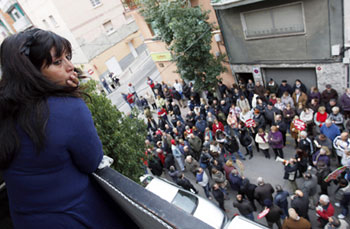

Vol. 77/No. 2 January 21, 2013

|
| Reuters/Albert Gea |
| Elizabeth Marquez from Ecuador looks out from balcony of her home in Badalona, Spain, Dec. 11, as neighbors and supporters gather outside to block her threatened eviction. |
Demonstrations against evictions exploded in November after 53-year-old Amaia Egaña threw herself out the window of her fourth-floor apartment as the bailiffs came to evict her. Egaña was the fourth person to commit suicide in the face of eviction in a month. More than 100 such suicides took place last year.
Protesters took to the streets across Spain, carrying signs that said, “This isn’t suicide, this is homicide” and “They get the money and we get the dead.”
Under pressure, the government of Prime Minister Mariano Rajoy announced a two-year suspension of evictions for cases of “extreme hardship,” affecting a small percentage of those facing the loss of homes. But even in those cases interest on the outstanding mortgage continues to mount.
Spain’s economy went into a tailspin in 2007 when a massive bubble in real estate burst in the midst of a deepening worldwide crisis of capitalist production and trade.
After five years of deepening depression conditions, there are 4.85 million workers without jobs, 10.3 percent higher than a year ago. In 1.7 million households across the country there is not a single family member who earns a wage. The Madrid Confederation of Employers and Industries predicts that unemployment will reach 6 million in 2013.
Following the crash in the housing market, home values plummeted 26 percent while workers holding mortgages saw their jobs and wages disappear.
Under Spain’s 100-year-old mortgage laws, “homeowners” must continue paying mortgages even after losing their homes.
Not only do the evicted often face a lifetime of mortgage debt, but are also placed on a blacklist that makes it virtually impossible to rent an apartment anywhere.
Spain, the fourth largest economy in the eurozone, has no emergency shelter system for families who lose their housing.
In growing numbers of working-class neighborhoods, the New York Times reported, “there are weekly clashes with the police and banking officials, as housing advocates and volunteers try to resist the evictions.”
Sometimes they are successful. The social pressures and some demonstrations have led unions of locksmiths in a few cities to refuse to participate in evictions.
One protest group, named the Mortgage Holders’ Platform, founded in Barcelona four years ago, reports it has prevented 510 evictions.
Many victims of eviction become “okupas,” reentering their old apartment after being thrown out or taking up residence in abandoned buildings. Because of the collapse of the housing industry there are an estimated 2 million empty housing units in the country.
“Squatting has become so common,” the Times reported, “that some real estate companies are reluctant to put signs on the outsides of buildings indicating that an apartment is available.”
Related articles:
‘Fiscal cliff’ deal prepares gov’t austerity aimed at workers
No ‘shared sacrifice’ for bosses’ gov’t
Front page (for this issue) |
Home |
Text-version home